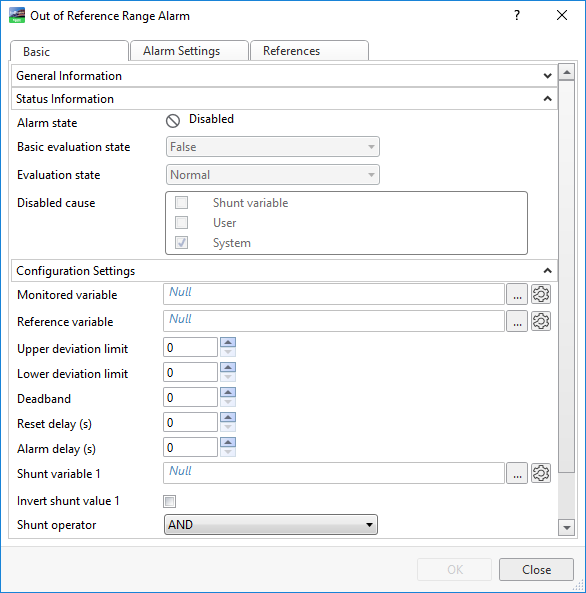
User Interface
Out of Reference Range Alarm Properties – Basic Tab
Use the Basic tab to view or edit the basic properties of an out of reference range alarm.

|
Component |
Description |
|
Alarm state |
Displays the present state of the alarm. For more information, see Alarm States . |
|
Basic evaluation state |
Displays False when the alarm is in its normal state. |
|
Evaluation state |
Displays the present evaluation state of the alarm. For example, Upper limit alarm is displayed when the monitored value reaches the upper alarm limit. |
|
Disabled cause |
Displays the cause for the alarm being disabled:
|
|
Monitored variable |
Enter the path to the variable that is monitored by the alarm. |
|
Reference variable |
Enter the reference variable that is compared with the monitored variable. |
|
Upper deviation limit |
Enter the highest value the monitored variable can increase to before the alarm is triggered. |
|
Lower deviation limit |
Enter the lowest value the monitored variable can decrease to before the alarm is triggered. |
|
Deadband |
Enter the range the monitored variable has to pass within the normal range before the alarm is reset. For more information, see Deadband . |
|
Reset delay (s) |
Enter the time, in seconds, the alarm has to be within the reset criteria before the alarm state is changed from alarm to reset. For more information, see Time Delay . |
|
Alarm delay (s) |
Enter the time, in seconds, the alarm has to be within the alarm criteria before the alarm is triggered. For more information, see Time Delay . |
|
Shunt variable 1 |
Enter the shunt variable that is used to enable or disable the alarm. For more information, see Shunt Variables . |
|
Invert shunt value 1 |
Select to invert the shunt value, that is, enable the alarm when the shunt value is active and disable the alarm when the shunt value is inactive. For more information, see Shunt Variables . |
|
Shunt operator |
Select AND or OR to add logic between the first and the second shunt variable. For more information, see Shunt Variables . |
|
Shunt variable 2 |
Enter the second shunt variable that is used to enable or disable the alarm. For more information, see Shunt Variables . |
|
Invert shunt value 2 |
Select to invert the shunt value, that is, enable the alarm when the shunt value is active and disable the alarm when the shunt value is inactive. For more information, see Shunt Variables . |
 Out of Reference Range Alarms
Out of Reference Range Alarms
 Out of Reference Range Alarm Properties – Alarm Settings
Out of Reference Range Alarm Properties – Alarm Settings
 References Tab
References Tab
 Alarm States
Alarm States
 Deadband
Deadband
 Time Delay
Time Delay
 Shunt Variables
Shunt Variables